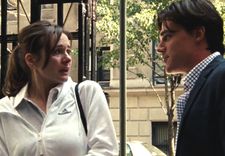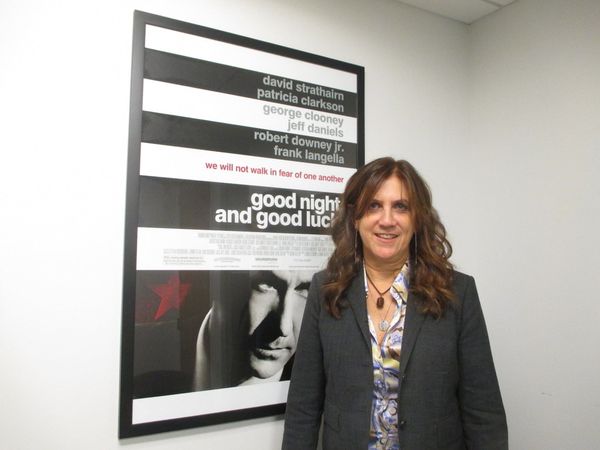 |
| Stacy Cochran on Good Night, And Good Luck., shot by her Write When You Get Work cinematographer Robert Elswit: "I think George Clooney did just this super fantastic job." Photo: Anne-Katrin Titze |
Stacy Cochran's Write When You Get Work, shot by Robert Elswit (Paul Thomas Anderson's Inherent Vice, There Will Be Blood, Punch-Drunk Love, Magnolia, Boogie Nights; Tony Gilroy's Michael Clayton; George Clooney's Suburbicon, Good Night, And Good Luck.) stars Rachel Keller, Finn Wittrock and Emily Mortimer with Scott Cohen, Jessica Hecht, James Ransone, Rosa Gilmore, Tess Frazer, Jennifer Mudge, Afton Williamson, and Andrew Schulz.
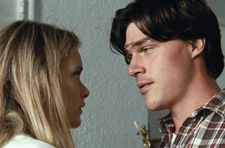 |
| Ruth (Rachel Keller) and Jonny (Finn Wittrock) in Write When You Get Work |
In the first instalment of my conversation with the director/screenwriter/co-producer of Write When You Get Work, Stacy and I discuss the spot-on look she created with costume designer Samantha Hawkins, the visual storytelling, what's in a word, camouflaging ourselves, her cinematographer Robert Elswit, and how writing a screenplay can be like writing a letter.
The title of Stacy Cochran's wonderfully offbeat, smartly written, and well observed Write When You Get Work functions as a promise and a threat. Ruth (Rachel Keller) and Jonny (Finn Wittrock) share a past, told in quick, telling snippets at the start. When we really get to know them is nine years (not months) later.
Ruth is now working in admissions at a private girls school on the Upper East Side of Manhattan, headed by a controlling and manipulative Guy Brinckerhoff (Scott Cohen). She has a protective mentor (Jessica Hecht) and an assistant (Tess Frazier) who help guide her through the new position she is put in. Jonny, from the past, who could claim trickster Caribbean God Legba as his guardian angel, exists in the in-between as his realm.
Emily Mortimer, in top comedic form, plays Nan Noble, full of anger, entitlement, and self-disgust, a professional wife to the rich and corrupt Steven, portrayed sheepishly by James Ransone. Stacy and her master cinematographer Robert Elswit, make us care and root for the fictional creations, which appear so alive because they give them a realness and humanity and absurdity that is all too rare in our screen saturated times.
Anne-Katrin Titze: What I like about your film is how much you keep us on our toes with visual storytelling. If we don't pay attention, something might escape us. For example the feathery coat.
Stacy Cochran: Yes, that's funny.
AKT: Did you structure the story around those things?
SC: Well. Yes! Normally I would say, "Oh, I don't know." But actually, it's scripted that way. When someone reads the script it says "There's this fluffy pink coat in the coat check." And then when you read the next scene, you read "The coat that you saw in the coat check is now on Jonny's [Finn Wittrock] current girlfriend."
AKT: Called Kandy [Rosa Gilmore].
SC: Yes! Which turns out an important word later. But anyway, what the heck, it's my movie, right? So I can do those little silly things. I write like I'm writing a letter to the person who is going to help me make the movie - that's the actor or the DP or the prop person. When you see it, you don't get to read that.
So I just have to hope you're going to make that connection. And it's kind of nice, because everyone's not going to notice it but some people will not notice it but think of it later or see it the second time and go "Oh my god, there's the coat." Or they're sitting next to their friend who goes "That's the same coat!"
AKT: You do lay those traces a lot with clothes and accessories. There is his shirt ...
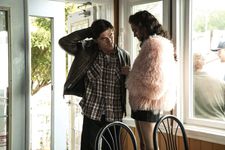 |
| Jonny (Finn Wittrock) with Kandy (Rosa Gilmore): "When someone reads the script it says 'There's this fluffy pink coat in the coat check'." |
SC: Oh, you ask such nice things! The shirt is one that I've had people say "It took me till the second time I saw it to go, oh my god, that's the shirt."
AKT: I thought it was very funny.
SC: Clothes do interest me in the way you can use them in a story because a lot of what I think about is the way we camouflage ourselves or costume ourselves. And in a way that's a lot what this movie is about. Because Ruth [Rachel Keller] has kind of learned that she has to put on what you might call a camouflage version of herself in order to have the kind of respect at work that is her job.
That can roll all the way back to originally thinking about people who work at these schools where the parents are sort of masters of their own life in their own mind. But when they're at these schools, they are for the first time needing to look up to people. Because it's up to someone who normally they would totally ignore on line for, like, a movie ticket. But in this case they have to kind of pander to people, or they think they do, because their kids' future seems to be at stake.
So for Ruth to be that person for those people she has to outfit herself in a way. She could have bought it at Century 21 for $12 but it just has to look right. Those people talk to her for a matter of five minutes - I shouldn't call them those people - it sounds like I'm not empathetic to all the characters - but do you see what I'm saying?
 |
| Ruth (Rachel Keller) and Jonny (Finn Wittrock): "A lot of what I think about is the way we camouflage ourselves or costume ourselves." |
AKT: I do.
SC: Clothes as camouflage and clothes as a way of helping you be a fraud in a kind of nice way, is important.
AKT: We all do it in certain ways.
SC: We all do, yeah.
AKT: You pick what you wear when. The dress Ruth is wearing at the party is really nice and suits her.
SC: I'm so glad you think so.
AKT: We could do the entire feature about the clothes. The tennis outfit, Emily Mortimer's character Nan is wearing at that particular occasion, for instance. Or her husband at home in his shirt that looks inside out and the ugly shorts because it doesn't matter. When it does matter that you present yourself and when it doesn't - I think you are playing a lot with that.
SC: Yes. It's kind of fun to let those things even creep into the dialogue. Because then you know that the characters are actually aware of it. He [Nan's husband Steven played by James Ransone] calls her on it and says "That's what you're wearing to the tour?"
And the way she says "They don't care." What she really means is "I don't care." It's sort of a power move to walk into the tour wearing that. Because she looks like someone who doesn't have to worry about it.
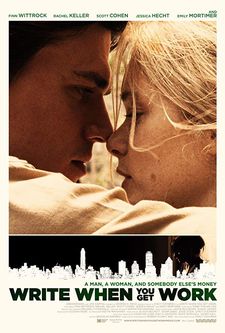 |
| Write When You Get Work poster - opens in New York on November 23 at the Village East Cinema |
AKT: Right, exactly. She wears the tennis clothes, signalling "Look, I've already got one [child] in. You'll take the other one, too." With a few points I was wondering if I caught the follow-up. Early on there is mention of Ruth not having a second pair of shoes at work and the borrowed shoes that are too big for her. Is there a reward coming later that I didn't catch?
SC: Well, probably not. That's a really wonderful question too because they didn't quite work as much as I thought they were going to. But I don't really mind. When she [Ruth] is coming home with the keys in her hand, she's wearing the wrong shoes, even to the memorial for Coach. There's so much going on, I couldn't also weave in that she's in wobbly shoes that are too big for her.
But there is a moment when she is taking the keys out and you can see that she is walking funny. That was a trickier one because it was a little bit of a broader symbol that she's wearing shoes that are too big for her. She's an assistant who's in the big shoes.
AKT: I'm glad I didn't miss it then.
SC: You didn't. You were so right. I don't think they made a problem but they didn't quite land.
AKT: Of course, you have a fantastic cinematographer - Robert Elswit.
SC: That's for sure.
AKT: Do you have a favourite film of his that was not with you?
SC: Oh, I think, Good Night, and Good Luck.. Which is right there [Stacy points to the poster on the wall in the Falco Ink. conference room we are in]. That's not why I say it, but I'm crazy about that movie. It's about a lot of stuff I really love and it has this look! Have you seen it?
AKT: Yes, I saw it at the New York Film Festival press screening in 2005.
 |
| Village East Cinema - Stacy Cochran will participate in a Q&A moderated by Anne-Katrin Titze following the 7:10pm screening on November 23. Photo: Anne-Katrin Titze |
SC: That's neat. It just goes a little further than real in all kinds of ways without feeling broad and I'm just crazy about that cast. And I think George Clooney did just this super fantastic job.
AKT: You never used any short-cut references, telling him [Elswit], like - "Can you do this the way you did it in Inherent Vice?"
SC: I would never do that! Not even out of politeness, it would never occur to me, is what I mean. Partly because I think - well, we have worked together before, Robert and I - which is why he so incredibly generously said "Come on let's do it. I can shoot it." He had just dropped out of something, he had a little window.
We found a little bit of money. We pulled the cast together really quickly and we shot it. We didn't have a production designer till the fourth day of shooting. We didn't have a location manager really until the second week of shooting. And we only shot for 20 days. But if Robert was available and he could shoot it and could be there for those 20 days ...
AKT: You knew it would work?
SC: Yeah. I knew it would work and I knew that I wasn't going to not do it, no matter what that meant. Once we were there, not only is he kind of unsurpassable in terms of just craft. I mean there are other people who are great and then it becomes taste - but in terms of his craft and his knowledge and his experience and communion with his materials and his tools - there is nothing more.
I'm sure he would say "Oh there's a lot I could still learn." But, not that much. Putting all that aside, the rest is that he is so funny and witty and the intuitiveness of the moment and the script was much more important than anything else he had ever done. He read the script, we talked quickly, he didn't have a whole lot of time for prep, as you can imagine.
Write When You Get Work opens in New York on November 23 at the Village East Cinema with a Stacy Cochran Q&A moderated by Anne-Katrin Titze following the 7:10pm screening.








